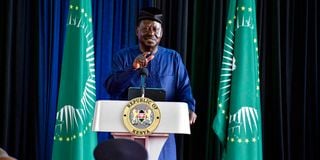Premium
Fake news on social media punctuates AU Chairperson’s debate

Kenya's Raila Odinga makes his remarks during the launch of his bid for the African Union Commission Chairmanship candidate at State House, Nairobi on August 27, 2024.
What you need to know:
- The Chairperson’s seat is decided through a secret ballot by heads of state and government.
- This may be the reason why members states seem reluctant to endorse candidates outright.
Former Prime Minister Raila Odinga and the other two candidates competing for the African Union Chairperson’s seat may well get ready to swat away fake news from now on.
Ahead of Friday's debate in Addis Ababa, dubbed as Mjadala Afrika, the contest took a contentious turn, as some Kenyan politicians shared pieces of misinformation that could threaten credibility of it all.
One such piece of information involved a fake poll. The false information also included fabricated endorsements.
One of the most vocal condemnations came from Amani Africa, a Pan-African policy think tank headquartered in Addis Ababa, Ethiopia.
Known for its credible analysis and insights into African Union matters, the organisation strongly denied involvement in any polls related to the chairmanship race.
“This is utterly irresponsible,” Amani Africa said in a statement on Tuesday.
“The use of our name and logo in a poll we never conducted is disinformation, misinformation, and maliciously criminal.”
The controversy arose after a viral graphic, bearing the think tank’s logo, suggested poll results favoring one of the candidates vying for the prestigious role. The fabricated poll fueled heated online debates, with supporters of the candidates accusing each other of foul play.
Amani Africa demanded its immediate removal from all platforms spreading the fake claims.
“We reject the misuse of our logo. We inform all that Amani Africa did not carry out any poll. Its logo is misused for propagating misinformation,” Amani Africa said in the statement.
However, the poster had been shared by so many people, including politicians in Kenya in what risked to become an anomaly on the Kenyan polity which has a candidate in the race.
Mr Odinga is facing off with Djibouti’s Foreign Minister Mahmoud Ali Youssouf and Madagascar's former Foreign Minister Richard James Randriamandrato.
While Mr Odinga has presented himself as the strongest contender, there has been no poll checking who is actually popular.
In fact, his opponents have also campaigned vigorously, emphasizing the need for visionary leadership at the continental body.
The Chairperson’s seat is decided through a secret ballot by heads of state and government. But it may also be decided by consensus especially if candidates pull out and one remains.
Which is why countries may be reluctant to endorse candidates outright before checking if their interests matter.
Traditionally, regional blocs have presented candidates which they endorsed. But this contest is different: it is part of the new policy of rotational leadership which means eastern African candidates are the only ones eligible to compete.
Eastern African is composed of various blocs such as Intergovernmental Authority on Development (IGAD), and East African Community. Some members belong to Southern Africa Development Community while others are in the Common Market for East and Southern Africa (Comesa).
In most cases, countries belong to multiple blocs at the same time, making a common endorsement difficult to attain when contenders are from the same region.





